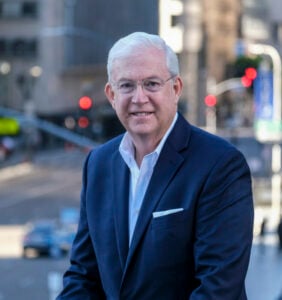Bill Allen, who will step down as Los Angeles County Economic Development Corp.’s president and chief executive in January, oversaw the local economy through two big downturns: the Great Recession and the lockdowns during the Covid-19 pandemic.
Of the two, the toughest period was, and continues to be, the pandemic lockdowns, he said.

“In the case of the great financial recession, we lost nearly 400,000 jobs in L.A. County,” Allen said. “In the pandemic, L.A. County alone lost 785,000 jobs in a two-month period because of the public orders requiring the shutdown of large sectors of our economy.”
While the Great Recession losses were eventually recouped, Allen said the region has only partly recovered from the pandemic after more than two years of effort to do so.
As of July, L.A. County was still without 129,000 of the jobs that were lost to the pandemic, according to Allen. Although the number is large, he added that 84% of the jobs lost in the first two months of the pandemic have been recovered.
However, Allen added, employment in sectors such as accommodation and food services, and arts, entertainment and recreation, have significant ground to make up.
“We devote a lot of our attention with our small business assistance to those kinds of businesses, many of which are owned by women and people of color, who had less capital available to them in launching these businesses, so they struggled to keep the businesses open,” Allen said.
The economic development organization’s broad mandate is to attract and keep employers in Los Angeles County while generally helping the local economy to grow.
Allen has been in this field for more than 20 years, but he first had a career in television.
He worked with CBS Television and later became the president of MTM Television, a production company founded by former NBC television executive Grant Tinker. Allen also led production on hit series such as “Remington Steele,” “St. Elsewhere” and “Designing Women.” His time in entertainment numbered 20 years, and he followed in the footsteps of his father, Steve Allen, a television and radio personality, and his mother, actress Jayne Meadows.
However, unlike Bill Allen’s journey into television, his next career path would present itself suddenly.
The Big Quake
Allen’s transition to becoming a business leader was born out of the tragedy caused by the 1994 Northridge Earthquake, a 6.7 magnitude seismic event that resulted in 57 deaths and tens of billions of dollars in property damage. Included in the destruction was a studio space that MTM Television operated out of.
“We owned half of that facility, and it was devastated by the Northridge earthquake,” Allen said. “I was asked by then L.A. Mayor Richard Riordan and several San Fernando Valley community leaders including David Fleming and others to help write a strategic plan for the San Fernando Valley’s recovery and to help execute that plan by creating the Valley Economic Alliance.”
Allen went on to be the economic alliance’s first chief executive from 1996 to 2000.
One of Allen’s greatest accomplishments at the economic alliance was developing the L.A. Metro Orange Line busway through the Valley. Allen credited that achievement to engaging with community partners. The importance of such collaboration was something he learned in the entertainment industry.

“No one producer, director or actor can make a television show happen or be successful. You have to get an entire creative team together to achieve success both commercially and artistically in the entertainment industry,” Allen said. “I took that same approach at the Valley alliance and at the LAEDC of building collaborative partnerships that could achieve goals we couldn’t achieve on our own as individuals or even as individual organizations.”
Allen’s departure from the economic alliance in 2000 involved the passing of his father. Allen took over as trustee of his father’s businesses, which included television licensing company Meadowlane Enterprises and music catalog publisher Meadowlane Music. In time, Allen would end up purchasing the companies.
In 2006, Allen returned to the economic development realm by taking over as LAEDC chief from Lee Harrington. Allen’s experience and achievements at the Valley Economic Alliance would be beneficial for his time leading the LAEDC.
Convening stakeholders
The great recession in 2008-09 and the Covid-19 pandemic were massive setbacks that the economic development organization had to help the region overcome.
In 2008, Allen and company brought together more than 1,000 local stakeholders from business groups, labor groups and government organizations to educational institutions and community organizations. With partners from these sectors, the economic development organization conducted 26 public workshops that facilitated conversations about how the local organizations wanted to create a more resilient economy that could better withstand future disruptions.
“(The Great Recession) really led to an unprecedented era of collaboration between the public and private sector to grow certain industries meant to improve our talent development pipelines, to accelerate infrastructure deployment throughout the region and to try and create a more business-friendly region,” Allen said.
In keeping with his impulse to convene groups, Allen was the lead behind the Los Angeles County Community Connectory, a specialized assistance program for small businesses owned by women and people of color that launched shortly after the onset of the pandemic. The program received philanthropic support from Wells Fargo, among others, which allowed the LAEDC to transform it into a stronger, small business support coalition.
Allen said that since he joined the LAEDC in 2006, the organization has strengthened its inclusivity, its strategic planning and the suite of services it offers to the county. One key addition during his tenure, according to Allen, was attracting foreign direct investment through World Trade Center Los Angeles, an affiliated corporation of the LAEDC.
“We’ve attracted billions of dollars and thousands of jobs from foreign direct investment into L.A. County that has created great quality jobs and infrastructure (initiatives) that I think we would have simply lacked without these investments,” he said.
New Chief
However, this year will mark the end of Allen’s tenure, an outcome greatly influenced by his family.
“My wife and kids have been remarkably tolerant of the 16-hour days required to run an organization like the LAEDC,” Allen said. “I’ll be turning 65 in November and my wife and kids (said) this might be a good time to turn the reins of the LAEDC over to the next generation, and they were exactly right.”
LAEDC Chief Operating Officer Stephen Cheung will take over the president role next month and assume the CEO role in January.
“Stephen has been a steadfast champion to crush the digital divide and to ensure an economy that works for all county residents,” Los Angeles County Board of Supervisors Chair Holly J. Mitchell said in a statement when Allen announced his retirement. “We are indeed grateful for Bill Allen’s 17 years of service and look forward to working with Stephen Cheung in the years ahead,” she added.
“Los Angeles deserves leaders who uphold the highest standards of service, and one of those public servants has been Bill Allen,” Mayor Eric Garcetti said. “For 17 years, Bill led LAEDC — becoming one of the greatest champions for our regional economy, and through Bill’s efforts, our city and county have experienced stability and success with innovation and competitiveness.”
Allen will continue his service on the boards of the Weingart Foundation, UNITE-LA, and the Valley Economic Alliance. He also is scheduled to become chair of FilmLA, a not-for-profit film office, in January.
Allen’s call to current and future business leaders in L.A. County not surprisingly circles back to engagement.
“Get engaged. Whether you’re leading a small business or a large enterprise, it is tough to succeed purely on your own,” Allen said. “In the 21st-century economy, you really need to engage with others in your industry.”
